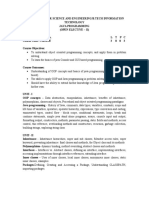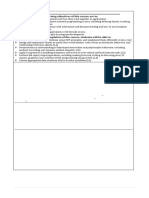16CST42 Java Programming
Uploaded by
vijaykrishanmoorthy16CST42 Java Programming
Uploaded by
vijaykrishanmoorthy16CST42 FUNDAMENTALS OF JAVA PROGRAMMING LT PC
3 2 04
Objectives:
To develop understanding of packages, interfaces, exception handling and object - oriented
programming concepts in JAVA.
To familiarize the development of simple GUI interfaces to interact with users, and
understand the event-based GUI handling principles.
Course Outcomes: Upon completion of the course, students will be able to:
1. Discuss the importance of Java over other object oriented programming languages.
2. Use programming language to solve simple problems.
3. Describe the use of various string and I/O functions.
4. Analyze the importance of collections framework.
5. Develop simple GUI applications using Applet.
UNIT 1 INTRODUCTION 9+3
The History and Evolution of Java – An Overview of Java – Data types, Variables and Arrays –
Operators – Control statements – Classes – Methods.
UNIT 2 INHERITANCE AND EXCEPTION HANDLING 9+3
Inheritance: Basics – Super keyword – Method Overriding – Dynamic Method dispatch – Abstract
classes – final keyword. Packages and Interfaces: Packages – Access protection – Importing Packages
– Interfaces. Exception Handling – Multithreading.
UNIT 3 LAMBDA EXPRESSIONS, STRING HANDLING AND I/O 9+3
Lambda Expressions: Introduction – Functional Interfaces – Method References. String Handling:
String Constructors – Special String Operations – Character Extraction – String comparison –
Searching and Modifying a String – String Buffer – String tokenizer. Exploring java.io: The Stream
Classes – The Byte Streams – The Character Streams – Serialization.
UNIT 4 COLLECTIONS FRAMEWORK AND APPLET 9+3
The Collections Framework: Collection Interfaces – Collection Classes – Using Iterator – Java Stream
API. The Applet Class: Basics – Applet Architecture – Skeleton – Simple Applet Display Methods –
Repainting – HTML APPLET tag – Passing Parameters to the Applet – Audio Clip and Applet Stub
Interface.
UNIT 5 AWT AND EVENT HANDLING 9+3
Introducing the AWT: AWT Classes – Window Fundamentals. Using AWT Controls, Layout
Managers and Menus. Event Handling – Delegation Event Model – Event Classes – Event Listeners.
Accessing Databases with JDBC.
TOTAL (L:45+T:15): 60 PERIODS
TEXT BOOK:
1. Herbert Schildt, “Java - The Complete Reference”, Eighth Edition, McGraw-Hill Education, 2011.
Paul Dietel and Harvey Deitel, “Java How to Program”, Ninth Edition Prentice Hall of India,
2.
2011.
REFERENCES:
1. Kathy Sierra, Bert Bates, “Head First Java”, Second Edition, O'Reilly Media, 2005.
2. “Java 6 Programming Black Book”, Kogent Learning Solutions Inc.,2007
Cay S.Horstmann, Gray Cornell, “Core Java Volume – I Fundamentals”, Ninthth Edition, Pearson
3.
Education, 2013.
e-RESOURCES:
http://www.nptelvideos.com/video.php?id=1471&c=15,
1. http://nptel.ac.in/courses/106105084/30, Java Programming, Prof. Indranil Sengupta, IIT
Kharagpur.
You might also like
- LOSADA - 1999 - The Complex Dynamics of High Perfomance TeamsNo ratings yetLOSADA - 1999 - The Complex Dynamics of High Perfomance Teams14 pages
- Course Code: A3579: Java Programming (Open Elective)No ratings yetCourse Code: A3579: Java Programming (Open Elective)1 page
- Syllabus-OBJECT ORIENTED PROGRAMMING THROUGH JAVANo ratings yetSyllabus-OBJECT ORIENTED PROGRAMMING THROUGH JAVA2 pages
- Object Oriented Programming through JAVANo ratings yetObject Oriented Programming through JAVA3 pages
- Object Oriented Programming Through JavaNo ratings yetObject Oriented Programming Through Java131 pages
- Java Programming (R17A0507) Lecture Notes B.Tech Ii Year - Ii Sem (R17) (2018-19)No ratings yetJava Programming (R17A0507) Lecture Notes B.Tech Ii Year - Ii Sem (R17) (2018-19)50 pages
- Programme: Diploma Programme in IF / CM Course: Java Programming Course Code: 1441 Prerequisite: Nil Teaching & Examination SchemeNo ratings yetProgramme: Diploma Programme in IF / CM Course: Java Programming Course Code: 1441 Prerequisite: Nil Teaching & Examination Scheme5 pages
- Lesson Plan (Fundamentals of Java Programming CS-261)No ratings yetLesson Plan (Fundamentals of Java Programming CS-261)3 pages
- Introduction To Java Programming LanguageNo ratings yetIntroduction To Java Programming Language2 pages
- Object Oriented Programming Through JavaNo ratings yetObject Oriented Programming Through Java130 pages
- Programming: Unit #2: Object-Oriented ProgramminNo ratings yetProgramming: Unit #2: Object-Oriented Programmin1 page
- Object Oriented Technique Using Java (Theory and Lab)No ratings yetObject Oriented Technique Using Java (Theory and Lab)6 pages
- Direct Vertegenwoordiging LEMASI 01-06-2021No ratings yetDirect Vertegenwoordiging LEMASI 01-06-20215 pages
- Preface: Nothing More Than This Study Material Is Required To Score A+ GradeNo ratings yetPreface: Nothing More Than This Study Material Is Required To Score A+ Grade166 pages
- (Ebook) Working Through Conflict: Strategies for Relationships, Groups, and Organizations, 9th Edition by Joseph P. Folger, Marshall Scott Poole, Randall K. Stutman ISBN 9780367461478, 9780367461485, 0367461471, 036746148X - The full ebook version is ready for instant download100% (3)(Ebook) Working Through Conflict: Strategies for Relationships, Groups, and Organizations, 9th Edition by Joseph P. Folger, Marshall Scott Poole, Randall K. Stutman ISBN 9780367461478, 9780367461485, 0367461471, 036746148X - The full ebook version is ready for instant download78 pages
- Instant ebooks textbook Blender 2D Animation: The Complete Guide to the Grease Pencil: Second Edition John M. Blain download all chapters100% (1)Instant ebooks textbook Blender 2D Animation: The Complete Guide to the Grease Pencil: Second Edition John M. Blain download all chapters65 pages


















































































